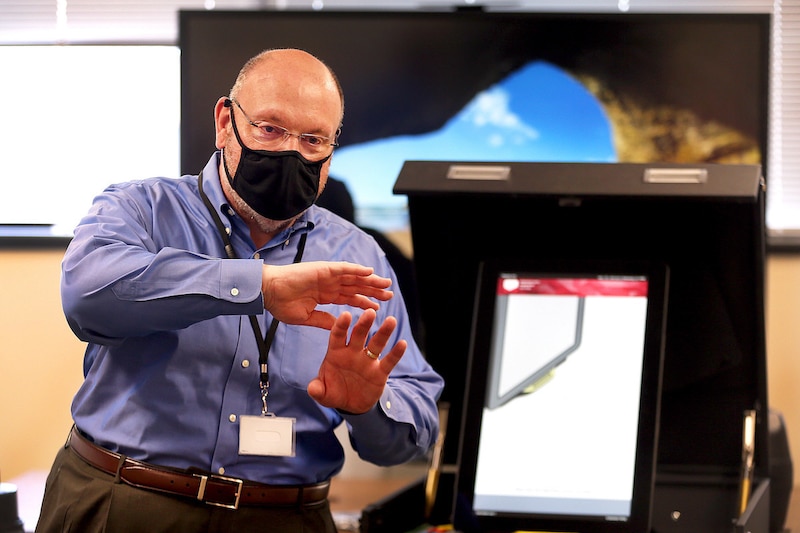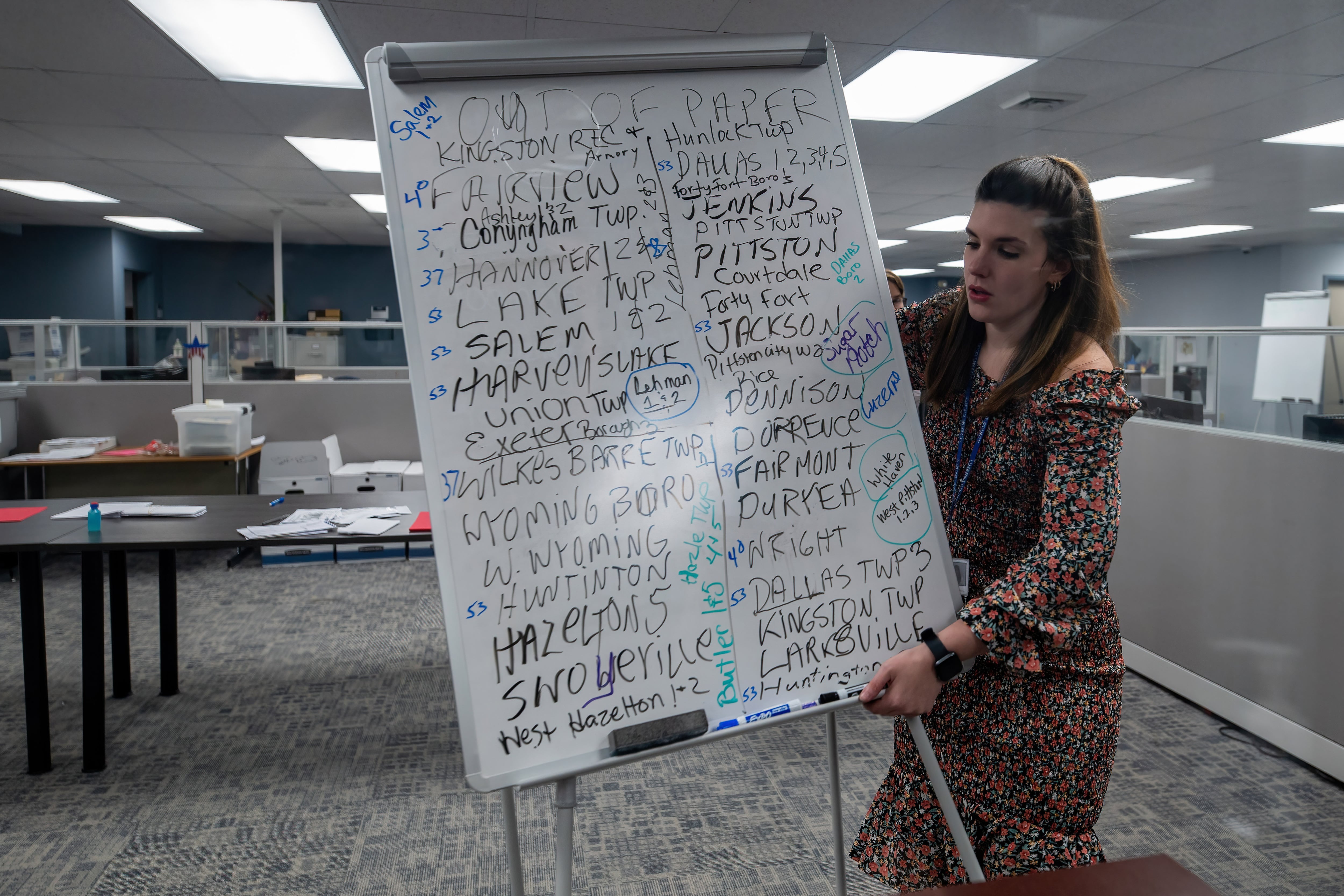Votebeat is a nonprofit news organization reporting on voting access and election administration across the U.S.
She may not have known it, but on Nov. 8, Beth Gilbert McBride was experiencing a Luzerne County election tradition. Or perhaps a curse.
Gilbert McBride, who had become acting director of elections just three months earlier, started hearing a trickle of reports in the morning about precincts running out of ballot paper. As the day dragged on, dozens of precincts would report a shortage. Some said they had to turn voters away for lack of paper to use in Luzerne’s ballot-on-demand printers.
Gilbert McBride and her election staff tried to keep track of the affected locations on a movable whiteboard as she rushed around the office trying to deal with the crisis. The county scrambled to order paper from local suppliers, and reams piled up next to the office Pepsi machine, awaiting delivery to the triaged list of 44 precincts. As the situation worsened, a local judge stepped in to order that polls stay open two hours late.
By the end of the day, Luzerne would be singled out by the Department of State as the only county with significant voting problems during an otherwise smooth midterm Election Day for Pennsylvania.
The exact cause of the paper shortage has yet to be disclosed. The local district attorney is investigating but has yet to release his findings, and neither Gilbert McBride nor the County Board of Elections has offered detailed explanations to the many residents who have demanded answers.
Gilbert McBride declined to be interviewed for this story.
What is clear is that the incident was not Luzerne’s first problem during an election and Gilbert McBride is not the first election director to oversee voting there with no prior experience.
Luzerne has cycled through election directors and other staff over the past several years, leading to an immense loss of institutional knowledge and making it an outlier even in an industry that has seen accelerating turnover.
This loss of knowledge, say current and former county officials and longtime election observers, resulted in another Luzerne election debacle. The deeper cause, they tell Votebeat and Spotlight PA, is the county’s unique government structure, low pay, and the stress on election workers.
“A lot of these [problems] are attributable to human error — in fact all these things in one form or another,” said Bob Morgan, who served as election director for eight months in 2021. “But part of it is exacerbated by people just leaving and the next person just kind has to figure things out by themselves and there is no formal training program.”
Gilbert McBride, who is also a Wilkes-Barre city councilwoman, was brand new to the election office when she started as deputy director in July. One month later, her boss was out the door, having served only eight months himself. With the midterms just around the corner, Gilbert McBride was temporarily promoted.
Last week, however, the County Council announced one change it hopes will put county elections back on track: another new elections director, with Gilbert McBride returning to the deputy position.
Turnover and trip-ups
Luzerne’s high turnover in elections leadership began in 2019 when Marisa Crispell, who had previously worked for the department and had experience running elections elsewhere, resigned amid ethics questions. Crispell did not return a call seeking comment.
Since then, the county has had a succession of four elections directors, plus acting director Gilbert McBride. Since the August 2020 resignation of longtime deputy director Mary-Beth Steininger, the county also has had five deputy directors.
One of those deputies was Eryn Harvey, who resigned in February 2022 after less than a year to run unsuccessfully for state representative — and now is Luzerne’s new hire for the top elections job. Harvey was succeeded by a deputy, Sarah Knoell, who stayed roughly three months in the job, which was then filled by Gilbert McBride.*
An analysis of data provided by the county shows the precipitous loss of experience. During the 2016 through 2019 elections, staff in the department had a median of 17 to 22 years of service. That number fell to roughly one year of median experience in 2020 and in 2021, when the November election was administered without a formal director in place.
The November midterm election was run by a staff with a median of 1.5 years experience.
On top of the turnover in the elections department itself, the county has also gone through a number of county managers, who help oversee the department. The latest county manager, Randy Robertson, resigned in November after just six months on the job.
The turnover has led to problems.
During the 2020 election, a worker in Luzerne improperly threw out nine ballots, an incident then-President Donald Trump seized upon to sow doubt in mail voting. The U.S. attorney for the Middle District of Pennsylvania later said there was no criminal intent, and the Pennsylvania Department of State said the mistake was due to poor training.
The director had less than a year of experience at the time.
Then, during the May 2021 primary, Republican ballots displayed on voting machine screens were mistakenly labeled as Democratic. A new director and deputy director had just been hired.
In the November election that year, which was run without a formal director in place, there were errors in printed ballots that had not been caught, two flash drives with votes on them were not uploaded in a timely manner, and mail ballots were sent out very late.
In April 2022, more than 300 ballots were delivered late during a special election, though the Department of State took the blame for that error.
Robertson did not return a call seeking comment, but in a December interview with a local newspaper he repeated his desire for the county to study the “root cause” of election office turnover, which he suggested in July could be due to pay.
Luzerne’s last four directors have been paid $64,500, which is the lowest salary compared to peers in similarly sized counties in the U.S., according to a 2022 survey of local elections officials by Democracy Fund and the Elections and Voting Information Center at Reed College.
Robertson also noted that the home rule structure has caused issues.
A tug-of-war over elections
In most Pennsylvania counties, elected commissioners also sit on county election boards that set rules for elections, such as whether to use drop boxes. But Luzerne is different.
In 2010, the county opted for a form of government few other counties have chosen, home rule. The option allows counties to write their own charter instead of following the state’s established rules for how counties are to organize their government.
This can mean elections are overseen by two masters. One is the county board of elections, whose four members — always two Democrats and two Republicans — are appointed by the county council. Those four members then elect a fifth resident as chair.
But it is the county council which controls the election department’s budget and hires the county manager, who hires and supervises the election director.
This has often led to disputes between the two bodies, including a fracas over control in 2021, when two Republican election board members attempted to elect a chairman who was also a Republican county council member. The county’s charter expressly prohibits elected county officials from serving on the elections board, and the attempt resulted in the two board members being removed.
More recently, the council proposed prohibiting county employees or funds from being used to place drop boxes in an effort to stop their use, despite the elections board’s decision to continue using drop boxes.
“The difficulty [election directors in Luzerne] have is the council thinks you should take your direction from them, and the election board thinks you should take your direction from them, and you’re pretty much certain to make everyone unhappy at some point,” said Morgan, the former election director.
Morgan said he thinks council members feel “they get the blame” when things go wrong and so they face pressure to act, even though they don’t have the same authority their colleagues in non-home rule counties might have.

Election directors in Luzerne have sometimes had a very contentious relationship with members of the bodies overseeing them. Shelby Watchilla, a former elections director who oversaw the 2020 election and resigned shortly after it, sued the county and a council member for defamation over comments they made about her handling of the department. The case is ongoing, and the council member at the heart of the dispute resigned in January 2022 to take office as county controller.
“Number one, the pay is not worth what is demanded [and] I think that it is a hostile work environment,” said Alisha Hoffman-Mirilovich, executive director of the local progressive group Action Together NEPA.
‘Continual negative feedback loop’
Denise Williams, a Democrat who has been chair of the elections board since 2021, agreed that the high turnover has led to election problems, but disagreed that the county’s structure is to blame.
Moving election oversight in 2010 from elected officials into the hands of volunteer, non-elected citizens, unlike in other counties, was the right move, she said. However, there could be better coordination between the different entities on issues like equipment purchases, she said.
Asked whether this structure is causing more stress on the directors and discouraging experienced election workers from applying, Williams said elections everywhere are now under a microscope, and it is making the job more stressful.
“Is it specific to Luzerne County because of the dynamic of the elections? I don’t know — that could be a part of it,” she said. “There’s been a high turnover rate and a loss of a lot of knowledge, and when you come in and you are new and the people above you are new, that is very, very challenging.”
But, she added, “that’s the setup of the government, so anyone who applies knows what they’re getting into.”
John Lombardo, vice chair of the Luzerne County Council, also disagreed that the home rule charter was a cause of turnover but acknowledged that turnover needs to be addressed.
“I think [the cause of the turnover is] definitely because the culture in that department has become unstable, and once that happens, it is hard to right that ship,” he said. “It just continually creates this negative feedback loop.”
Lombardo, a Republican, said the council needs to have more of a say in overseeing the elections since they provided funding. He favors an amendment to the county charter to allow a council member to serve as board chair, which isn’t currently allowed in Luzerne. These types of appointments have not been an issue in non-home rule counties, where commissioners serve on the board, he said.
Citizens have hard time trusting local government
Conservative activists allege that the county’s history with corruption has made it difficult for residents to trust local officials’ explanations for recent election errors.
Ben Herring, an activist with a local right-wing group the Citizens Advisory of Pennsylvania — which formed in 2021 to influence school board elections and “keep Critical Race Theory out of schools” — specifically mentioned one of the state’s most infamous scandals, known as “Kids for Cash,” in which two Luzerne County judges in 2008 took kickbacks from child detention centers for sentencing children to those centers.
The incident made Luzerne synonymous with corruption for some, and residents like Herring have not forgotten. Now some residents are suspicious when things go wrong with the county’s elections, he said.
“I think if we didn’t have this history we would sway more toward this being a mistake,” he said of the Election Day paper shortage. But without answers to their questions, he said, they’re forced to wonder, “Is this some underground thing that we don’t know about or are we overthinking it?”
Herring said he believed the issues with the department go deeper than a lack of institutional knowledge, insisting there must be some type of manual or written guidance for elections’ employees to follow.
Morgan said there isn’t any such manual, but residents shouldn’t be surprised that one doesn’t exist. Morgan likened the extra work of creating a manual to firemen shining the firetruck when there are fires going on, saying that there are more urgent things to be done in administering elections.
His version of onboarding was his boss handing him a copy of the ballot for the upcoming election and saying, “Proof this.” Similarly, Morgan left little in the way of instructions for his successor, Michael Susek, the director who left when Gilbert McBride was barely 30 days into her job as deputy.
For his part, Morgan said he understands why “Kids for Cash” bred distrust. But what, he asked, could possibly be gained from a paper shortage? And how would such a conspiracy be organized? Residents need to understand that the explanations are more mundane than they imagine, he said.
While working for a congressman, Morgan often heard from constituents who thought the federal government was conspiring against them when errors with their paperwork occurred. It often resulted from misunderstanding how government works — and an almost comical overestimation of government’s ability to orchestrate complicated efforts.
“I’d say, ‘Let me remind you of something, we are required by law to conspire to deliver the mail, and how are we doing?’ ” he said.
Of course, so far, no one has explained exactly what led to the paper shortages.
District Attorney Sam Sanguedolce told Votebeat and Spotlight PA that the “bulk of the legwork” of his investigation into the paper shortage had been completed and he expected to have a report soon, though he did not offer a timeframe. When asked, he said it “will be determined by the results” of the investigation whether the cause of the paper shortage was human error.
Now that the county has hired a new election director, Lombardo would like to bring in an outside consultant, perhaps from the County Commissioners Association of Pennsylvania, to study the department.
“Hopefully,” he said, “that will give us the secret sauce to make changes and have progress there.”
Carter Walker is a reporter for Votebeat in partnership with Spotlight PA. Contact Carter at cwalker@votebeat.org.
Correction, Feb. 16: This article originally stated that Luzerne has had four deputy directors since August 2020 and that Eryn Harvey immediately preceded Gilbert McBride as a deputy elections director. One other deputy was in the job for roughly three months before Gilbert McBride.






